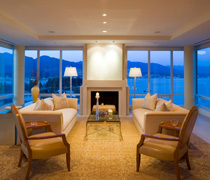Parking Facilities
Are the facilities outdoors or underground? Do you feel there is sufficient lighting for security protection? Is it a long distance from the parking spot to your home? Is there parking space available for a boat, trailer, or second car, and is there ample visitor parking?
Storage Facilities
Check out the type of storage space available, including location and size. Does there appear to be sufficient storage space for your needs, or will you have to rent a mini-locker to store excess items?
Quality of Construction Materials
Thoroughly look at your building and the surrounding development in an attempt to make an assessment of the overall quality of the development. Keep in mind that you will be responsible for paying a portion of the maintenance costs for the common elements. You may wish to hire a contractor whom you trust, or a building inspector, to give you an opinion on the quality and condition of the building or unit before committing yourself. An older building is clearly going to cost money to repair, and possibly in a short period of time.
Design and Layout
When looking at a building, consider your present and future needs. In a condominium, although you are entitled to use the interior of your unit as you wish, there are restrictions relating to the exterior of your unit or any structural changes that you may make to the unit. If you are intending to have a separate room for an expanded family, in-laws or an office, you should consider the implications beforehand. For example, you may find that the balcony is very windy and you would like to have a solarium built to enclose the balcony for that reason. There is a very good chance that you would not be able to do so without the consent of the condominium council, because it would affect the exterior appearance of the development.
Neighbourhood
Look at the surrounding neighbourhood and make an assessment as to whether the value of the residences in the neighbourhood will affect the value of your property. For example, are the buildings and homes in the area well-maintained? Are there children in the same age group as your own children? Is the neighbourhood characterized by single adults, young couples (with or without children), or older and retired people? Does your condo development permit children?
Owner Occupiers vs. Tenants
Ask how many tenants as opposed to owners there are currently in the condominium complex, and the maximum number of tenants allowed. The higher the percentage of owner/occupiers, the better the chance that there will be more pride of ownership and, therefore, more responsible treatment of common elements and amenities. Generally, you should be concerned if the tenant percentage in the condominium complex or residential area is 25% or more and is increasing, or does not have a rental cap. Of course, if you are buying a condo for investment purposes, you would be looking at matters from a different perspective.
Management
Enquire as to whether the condo building is being operated by a professional management company, operated by a resident manager, or is self-managed. Ideally, you should check out the condominium unit or property that you are interested in at three different times before you decide to purchase: during the day, in the evening, and on a weekend. That should give you a better profile of noise factors, children, or parties, and the effectiveness of the management control.
Property Taxes










